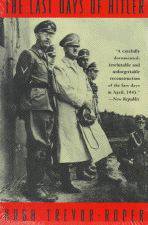

| Click on a book's image or title to order from Amazon.com |

The Last Days of Hitler
by High Trevor-RoperUniversity of Chicago Press, TPB, Sixth Edition, © 1987, 281 pp, ISBN #0-226-81224-3
Reviewed November 1997
In the waning days of World War II, Trevor-Roper was sent to Germany by the British government to verify the fact of Adolf Hitler's death. A quick check of your local supermarket tabloids should explain why this was necessary; many people deny the deaths of President John Kennedy and Elvis Presley, and others (of less pure motive) deny the fact that the Holocaust happened (although there is ample irrefutable proof of its occurrence). The allies were concerned that if Hitler were not determined to be definitively dead, then it would be all-too-easy for Nazis and neo-Nazis to deny this fact for their own ends.
Trevor-Roper interviewed dozens of people in mid-to-late 1945, was given access to the Fuehrerbunker by the Soviet forces, and was able to interview several other key witnesses when they were returned to Germany from Russian imprisonment in 1954. The result is this book, a detailed examination of the personalities leading the Nazi government in 1944 and 45, how they handled their defeat at the hands of the allies, and what happened in Berlin during the last ten days of Adolf Hitler's life.
Ironically, the Soviets seem to have felt similarly to the allies that efforts should be taken to prevent later risings of Nazism, but they felt this end was best served by covering up the details of Hitler's death. It seems likely that they spirited away Hitler's body to another location - probably in Russia - and lost it for good. Nonetheless, Trevor-Roper's interviews seem to determine that Hitler is in fact dead, as several witnesses were able to independently confirm the circumstances of his death, the burning of his body, and its burial in a bomb crater outside the Fuehrerbunker. Trevor-Roper is careful not to accept at face value the statements of any single witness (although a handful of interviews, notably the testaments of Albert Speer, he gives somewhat more weight to, as he finds they have been unusually reliable in other cases), so everything is carefully cross-checked. He even provides a solid refutation of the counter-argument that Hitler's subordinates were trained to provide a cover story to give the impression that he is dead when he was actually alive; no such cover story seems possible, given the testaments of the people involved.
The really remarkable part of the book is the great detail which Trevor-Roper was able to reconstruct from a relative handful of witnesses, few of them high in the Nazi ranks. He also pieces together information about the personalities of various Nazi leaders (Himmler was a dullard; several lesser leaders were deluded about their powers and abilities; until just a few days before the end it was utterly forbidden that any true Nazi should consider that the war might be lost, even when its result had been evident for a year, etc.). As a piece of factual and psychological history, this book is a fascinating document.
hits since 13 August 2000.